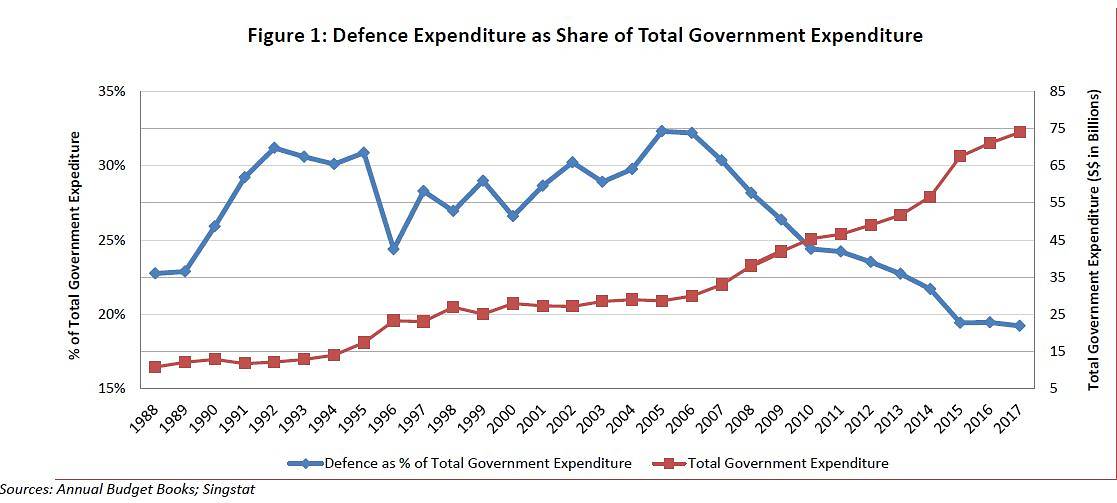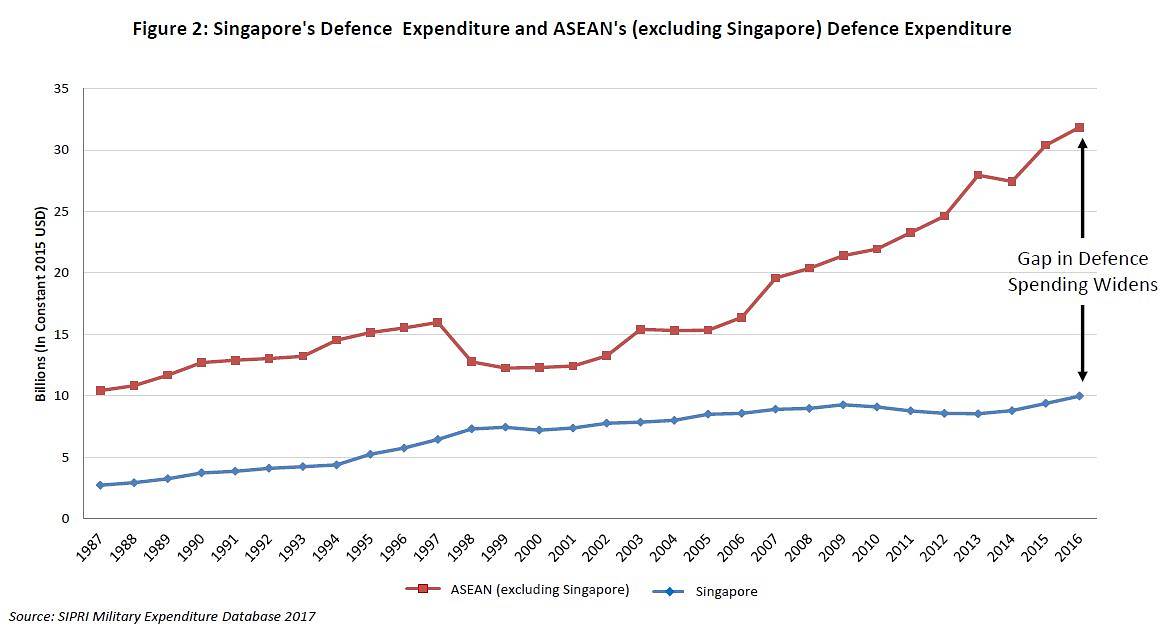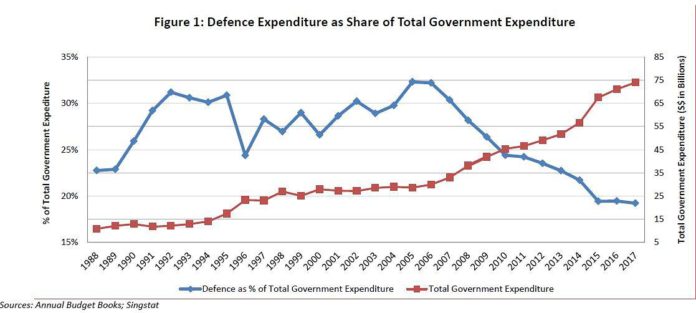SINGAPORE: Singapore’s defence expenditure will be maintained at a level that keeps pace with inflation – around 3 per cent to 4 per cent increase each year – despite emerging threats and increased spending by neighbouring countries, Defence Minister Ng Eng Hen said.
“In the next decade, MINDEF (Ministry of Defence) does not foresee any spike in defence spending,” he said in his Committee of Supply debate speech in Parliament on Friday (Mar 2).
“Obviously, this will not apply if there are exigencies or unexpected scenarios. If there are terrorist attacks or if the security environment deteriorates, our agencies will have to spend more to protect Singaporeans.
“After the next decade, we will have to reassess then the security threats and the military spending and capabilities of other countries and plan ahead.”

Chart showing defence spending as a proportion of Government spending over the years.
Singapore’s defence spending has grown from less than S$5 billion in 1988 to about S$14 billion last year, making up 19 per cent of the Government’s expenditure. But Dr Ng pointed out that this proportion is a significant dip from its peak in 2005, when defence accounted for a third of all Government spending.
“With the SAF (Singapore Armed Forces) modernised and doing more with its people and technology, defence spending as a portion dropped substantially in the last decade,” he said.
To that end, SAF saved S$200 million last year through innovation and better work processes, Dr Ng said, with this figure being the highest in four years. These innovations include unmanned watch towers, smart airbases and unmanned vessels.

Chart showing Singapore’s defence spending against that of ASEAN’s (excluding Singapore).
In smart airbases, the Republic of Singapore Air Force will use drones to assess damaged runways and data analytics for aircraft maintenance. Meanwhile, the Republic of Singapore Navy will deploy unmanned vessels for patrols and to detect and clear underwater mines.
“The SAF upgrades existing equipment where possible to avoid buying new platforms,” Dr Ng said, highlighting improvements made to existing hardware like Leopard tanks and Chinook helicopters.
“The SAF will not compromise on defence capabilities but has found ways to optimise resources, and stretch every dollar,” he added.
EMERGING THREATS
All this comes as Singapore faces emerging threats in the form of terrorism and cyber attacks, with the latter potentially being “as devastating as physical attacks”, Dr Ng said.
“These attacks are conducted by freelancers, as well as organised state and non-state actors,” he added.
As nondescript emails containing malicious software deliberately target senior military figures and departments handling sensitive information, MINDEF adopts a multi-layered approach to cyber defence, Dr Ng said.
This includes big picture programmes like the Cyber NSF Scheme and bug bounty programme, as well as physical steps like separating sensitive systems from the Internet and deploying “red teams” that test for system vulnerabilities.
As for counter-terrorism efforts, Dr Ng said the Island Defence Training Institute has trained 18,000 servicemen for homeland security operations. From this year, recruits undergoing Basic Military Training will also be trained to contribute as first responders in a crisis or security incident even when off-duty.
In addition, SAF’s Homeland Security Training Centre and the Singapore Police Force’s Frontline Policing Training Centre will be conducting routine joint training sessions from early this year to train soldiers to perform homeland security operations.
Nevertheless, Dr Ng said Singapore needs to be part of the international effort to “deal with terrorism at its source”.
“We need to work with ASEAN neighbours on counter-terrorism, especially because the risk of foreign fighters leaving Iraq and Syria has increased,” he said, adding that Singapore’s offer to help the Philippines patrol the Sulu Seas still stands.
In addition, Dr Ng said SAF will continue deploying troops to Iraq later this year in the fight against ISIS. This follows a request from US Secretary of Defence James Mattis for Singapore to commit more resources, he said.
The SAF Counter-Terrorism Training Unit, together with Australian and British forces, will train the Iraqi Security Forces to counter improvised explosive devices, as well as in tactical weapons and combat tactics.
“Singapore will maintain our commitment to counter-terrorism globally, for our own interests,” Dr Ng stated. “The partnerships forged from playing our role internationally are important in dealing with transnational threats that affect our own security.”





